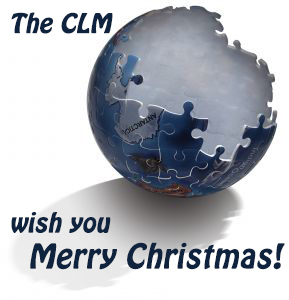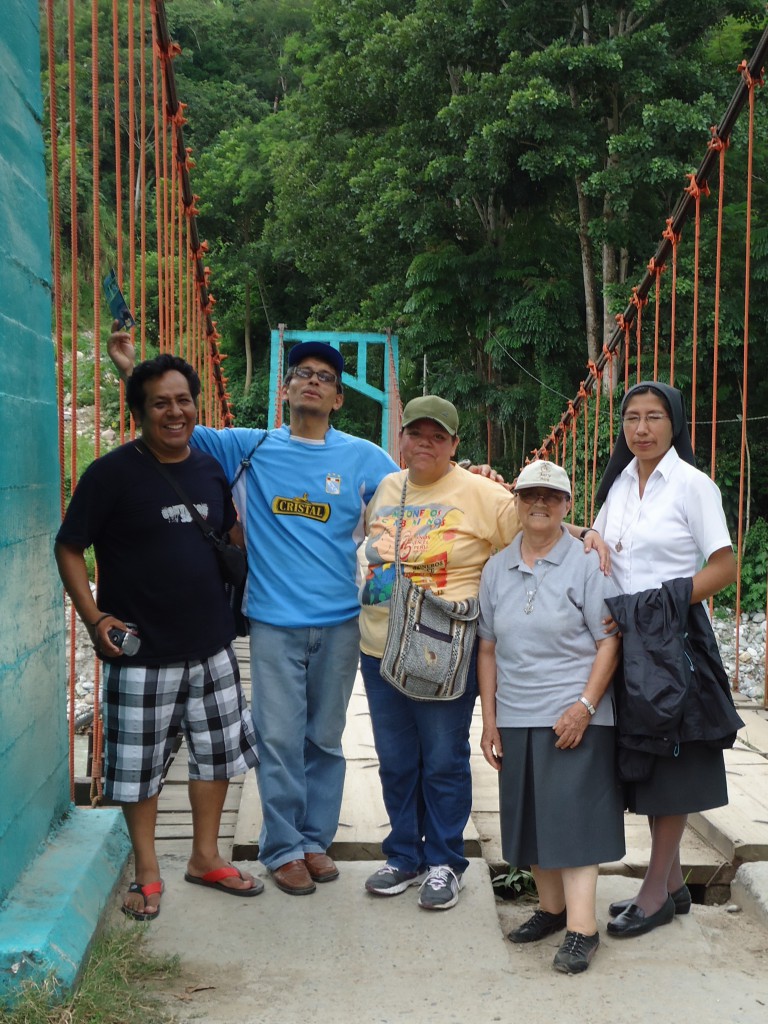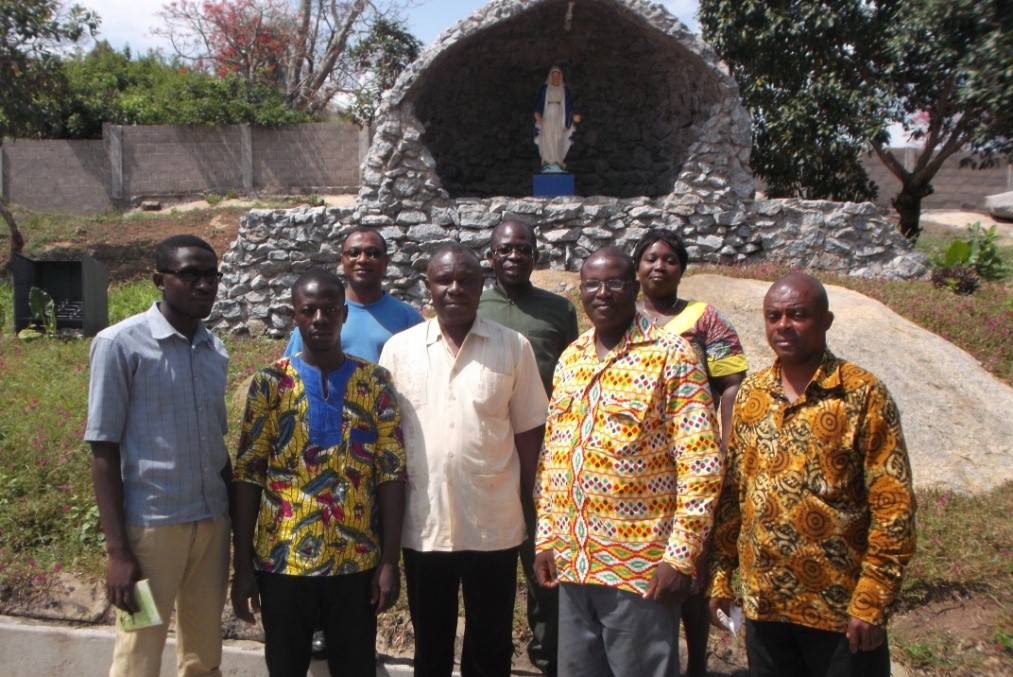English
Children and poor rejoice in my presence
Testimony of Leticia Ordoñez Bañales
Originally from Guadalajara, Mexico, this Comboni Lay Missionary (CLM) decided to accompany the Catholic community of Rondos, a small town located on the heights of the province of Lauricocha, in the department of Huanuco, since November 2011. She ends her commitment this year and now tells us about her experience.
My vocation began when I was 16; I attend a Mass of missionary sending. The parish organized the event to send a Comboni priest who was leaving for Africa. I felt the call of God and in 1988 and I joint the religious Missionaries sisters of Guadalupe. However, I didn´t feel my vocation realizes and in 1999 I retired to participate in the mission fields in Guatemala with the Episcopal Pontifical Mission Societies of Mexico (SSMO) until 2000.
In 2001 I joined the CLM while working in the parish notary of Saints Crispin and Crispiniano of Guadalajara. In 2004, I had to drop everything and travel to Mexico FD to participate in an experience of community formation with other Comboni Lay Missionaries.
I first came to Peru with Rocío Quintero, my Mexican partner, in 2005. We were both sent to Huarin, in the Sierra de Huanuco. Salome Flores, a Peruvian lay, joined us and accompanied us for a year. Rocío had to return to Mexico after the second year. The third year came the Peruvian laities Doris Pereira and Enrique Garcia. I returned to my country and between 2009-2011 participated, along with Mexican CLM Marcela Alanis and Olivia Ayala, of the new mission in Metlatonoc in the state of Guerrero.
Currently, Rondos is the town where I perform my mission since November 2011. When I arrived, I found again Rocío. Together we carry out the work with the “mamitas” and an education program for the children of the town. We give religion classes in primary schools and biblical catechesis for children and youth. We keep the library open during the summer months and organize “useful vacation” workshops for students. Besides, we have training at the School of Mothers and prepare candidates for the sacraments. Especially, we encourage couples to marry in church, but only there was a marriage in 2013. The patron saint fiestas are times of increased demand for sacraments. We always consider on our agenda visiting the sick and helping the poor and vulnerable elderly.
This second experience in Peru has been characterized by the loneliness that many times I have lived. After six months Rocío had to return to Mexico. After a while came Daniel, a Peruvian CLM, with a great desire to work and a great friend of children. But he only remained seven months. The time he was, we make a great teamwork. Last year they sent Sharliman, a Brazilian CLM, who could not get used to the altitude of 3650 m and had to ask to be transferred to Arequipa one month after reaching Rondos. However, the whole time I was alone, God and Mary have been my company.
I confess you that many times I say to God: “What do I do here alone?” And the answer comes from children who knock on the door to ask me something; mamitas who ask me “How are you?”; young people who say, “I have come to visit you”; the sick and abandoned that rejoice in my presence. The school kids exclaim with joy sister Lety! Behold my reason for being present among them! You may wonder why I did not stay? Because I need my blood family and they also need me. In addition Rondos has the right that YOU take my place.
Magazine “Missión Sin Fronteras”
CLM Group Meeting in Ghana
On the 21st October 2014, I met the Father Provincial about the journey of the CLM Aspirants. A chaplain was given to us and a new strategy was defined by the Province about us. Our chaplain is Rev. Fr Godwin Kornu. Since then, we were planning to meet and this 5th December, we held our 17th meeting at Mafi-Kumase the Quasi Parish where our chaplain is. We were in all 8 lays with our chaplain. After the opening prayer, we proceeded with the Spiritual Reading from He lived only for Africa by B. Ward and A. Mondini. The passage read was the Experience of the Cross. For the first meeting with our chaplain, we introduced ourselves. From our previous meeting’s minutes, we heard about the work of two Committees, Formation and Fund Raising. The two Committees reflected upon the formation process and the various ways of generating income. Their suggestions need now critical analysis and for that matter, any decision was not taken, for us to go and reflect more about the issues with the help of our chaplain. The report about our activities since the beginning was then given. Our chaplain took then the speech to tell us the journey he has to make with us. His service is to form us, a spiritual formation which involves”lay, Christian, missionary and Combonian formation”. He explained how he intended to proceed with us: themes to present, recollections, retreats… The place, time and date were at once decided for the coming meeting and the topic to talk about. After this, few matters were discussed and the meeting came to its end with the concluding prayer (Prayer of the Comboni Family) with blessing. We took our family picture and the lunch before departing from the place.
We are very happy of the attention and zeal of the Province towards us and we thank, of all our heart, for all the decision taken for our spiritual and vocational growth. We saw how serious and dedicated our chaplain is. The experience he had with CLM when he was at Chicago and also some years in formation predisposed him for this service assigned to him by the Fr Provincial and His Counsel. May the Lord strengthen him spiritually to strengthen us and lead us on Comboni’s steps. We are so blessed because we are surrounded by so dedicated persons and zealous priests who believe in the CLM reality. May we too be inspired and ceased by their missionary and combonian zeal.
Justin Nougnui, coordinator.
Annual Assembly of the CLM Brazil
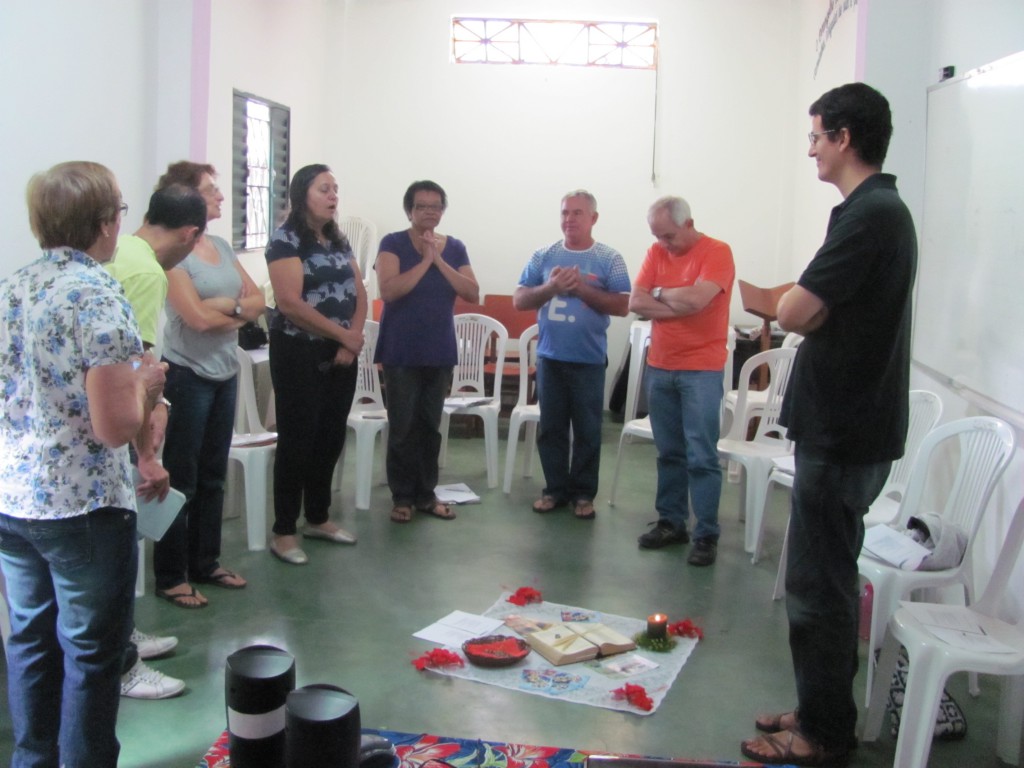 The CLM in Brazil went back to the origins of their vocation, update the directory and assess progress made throughout 2014.
The CLM in Brazil went back to the origins of their vocation, update the directory and assess progress made throughout 2014.
“In short, who is the missionary? Short, short, it is the one who transmit the love of God for others in order to become disciples”. On the first day of the annual meeting, which began on December 5, the Comboni Lay Missionaries (CLM) in Brazil were able to return to the origins of their vocation by reflecting with the Provincial Fr. Alcides. Which emphasized the importance of the church to encounter people and ask what the Spirit speaks to such a complex reality today. The provincial of the Comboni Missionaries in Brazil – which cited several times the II Vatican Council and the Apostolic Exhortation of Pope Francis “The joy of the Gospel” – wanted to remember that “every place is a land of mission and who saves is Christ, not the church”.
The meeting included several Brazilian CLM – João, Lourdes, Guilherma, Valdeci, Adélia – three Italians – Emma, Valentina and Marco – and a Paraguayan, Alejo. In the afternoon came also Father Adriano, who was appointed as the MCCJ representative for the laity.
Another important theme of the meeting was to review the Directory of the CLM in Brazil, which is a document that was written almost 20 years ago and was in need of an update. Among other things, the board now anticipates the arrival of CLM from other countries and defines the modalities of cooperation with the other provinces in these cases.
The meeting, as always, was also an opportunity to learn more about the performance of the various CLM both in Brazil and in other countries: Mozambique, Peru, Rondônia, in Nova Comtagem (MG), in Itauna and other cities (APAC). Also announced the availability of the Mozambican CLM to receive Guilherma, Brazilian CLM, already next year. Among songs and dynamics in the afternoon was also made a report on the economy of the CLM.
The meeting was also an opportunity for the CLM to share the progress during 2014 in a more informal way, lunching and dining together at the Comboni House of Nova Comtagem. This Saturday, December 6, will be the second and final day of the meeting, with a very rich agenda: The schedule for the next biennium, the report on the meeting in Guatemala and the situation of the laity in Açailândia (MA) Adélia, the choice of the CLM coordinator in Brazil, reflections with the psychologist Richardson and other matters.
CLM Brazil
We have discovered the wealth of life
Interview to Emily and Rafael Harrington in “Misión sin fronteras”.
A couple of lay people who found love and inspiration giving them up to children with different abilities and their families.
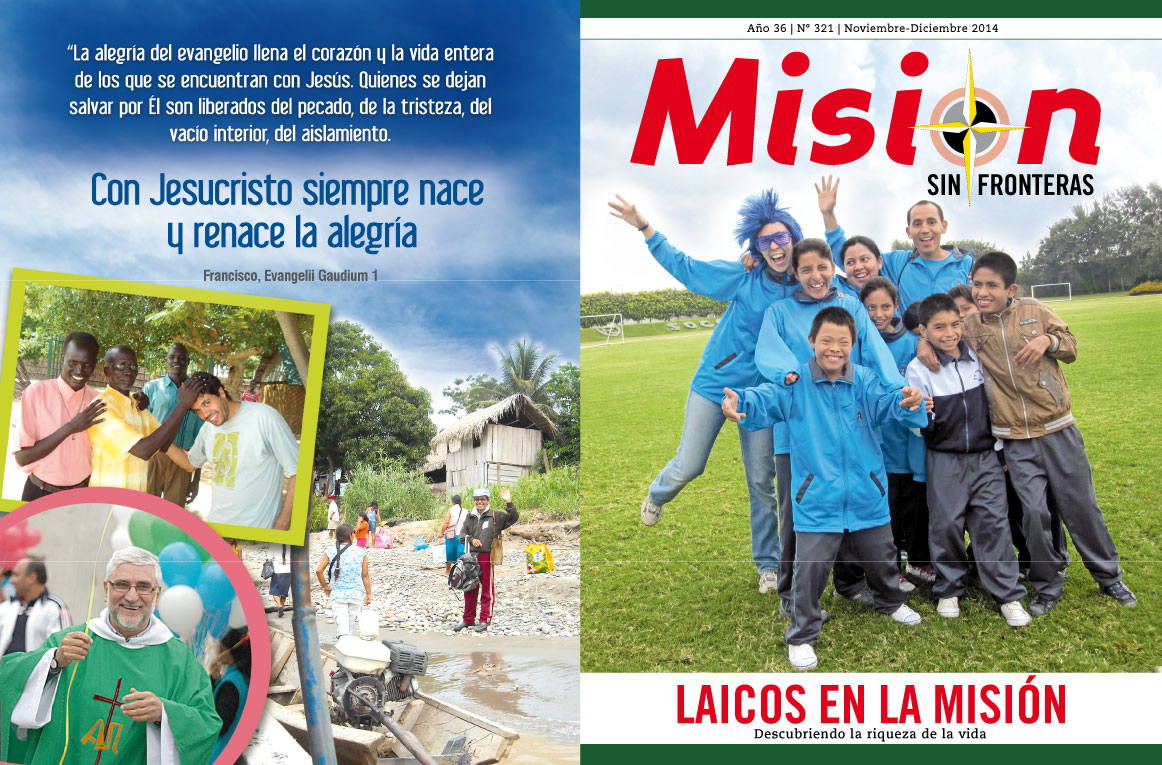 The Harrington lived their first year of marriage in the United States and were prepared to collaborate with the work of the Comboni missionaries in Peru. They came to Lima from Minneapolis, Minnesota, three years ago and the next day departed for Trujillo, where they were expected for 30 children of a school for special children. The couple ends this year the first period of work and assesses whether to renew the commitment. Challenged they tell us some details of their experience.
The Harrington lived their first year of marriage in the United States and were prepared to collaborate with the work of the Comboni missionaries in Peru. They came to Lima from Minneapolis, Minnesota, three years ago and the next day departed for Trujillo, where they were expected for 30 children of a school for special children. The couple ends this year the first period of work and assesses whether to renew the commitment. Challenged they tell us some details of their experience.
What activities have you carried out in these three years?
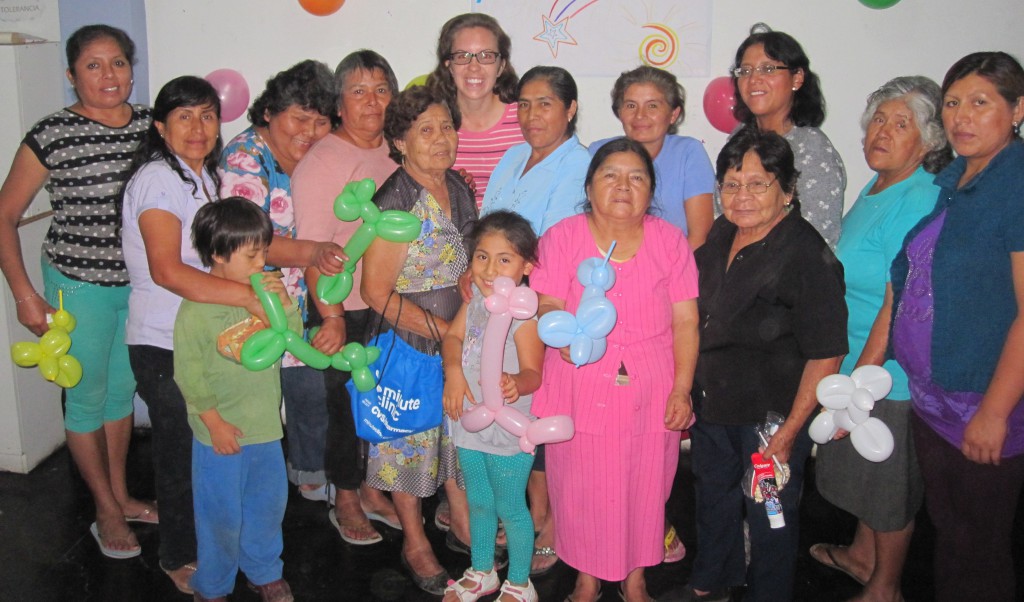 Emily: We work in three centers in the parish: Santa Rosa, Kumamoto and Villa El Paraíso, all on the outskirts of the district of El Porvenir. In Santa Rosa, I supported in the field of school psychology and Rafael in physical education. I participated in school for mothers and, during Lent, in a prayer group with my husband. In addition, a community of ladies get enthusiastic with baking, asked the school principal to give a workshop and I was elected as coordinator. Three times a week, we attended Kumamoto children, sometimes at Villa El Paraiso, in the organization of academic reinforcement, prayer and games.
Emily: We work in three centers in the parish: Santa Rosa, Kumamoto and Villa El Paraíso, all on the outskirts of the district of El Porvenir. In Santa Rosa, I supported in the field of school psychology and Rafael in physical education. I participated in school for mothers and, during Lent, in a prayer group with my husband. In addition, a community of ladies get enthusiastic with baking, asked the school principal to give a workshop and I was elected as coordinator. Three times a week, we attended Kumamoto children, sometimes at Villa El Paraiso, in the organization of academic reinforcement, prayer and games.
What challenges do found in your work?
Emily: The first months were used to meet neighbors. In Kumamoto, it was difficult to summon them because we do not live there and we knew just a few people. The pastoral center was closed and when we opened the doors no one entered. We had to go out and find the children. Now there are so many that we have to divide into small groups to work in comfort. In Santa Rosa, the challenge was to organize my work in the department of psychology at the special school, because I was mistaken for therapist. When someone needs this attention I refer to the appropriate person.
In the group of pastries, moms were happy from the first meeting. However, the challenge in that group was the lack of resources and small infighting. From these crises, they learned to work in teams, created rules and regulations and made better decisions.
Rafael: The first difficulty I encountered in physical education was the lack of adequate training to customize my therapeutic interventions. Each child has different abilities: one is in a wheelchair, some do not walk well or their intellectual state differs from the rest. I could not help everyone equally. My treatment has been general to include the majority. One or two children have been left out because they require the undivided attention of a person.
The second limitation was the lack of resources. For example the first year, the school did not even have a ball and gradually we acquired the basic equipment needed. Third, the school is small and the recreation space is not enough to perform well physical activities.
How do you help the mothers of the children?
Emily: Families usually do not easily accept to have at home a child with different skills. They have to live with the burden of the people on the street, which stares at them or makes inappropriate comments. Following that, we created a support group for moms who meet twice a year. There they have opportunity to talk about their experience. I accompanied the moderating an also control the time so that everyone gets the chance to talk and at the end of the cycle we do a little walk. It is an activity that ladies like and ask when we organized another meeting again.
What joys has given your work?
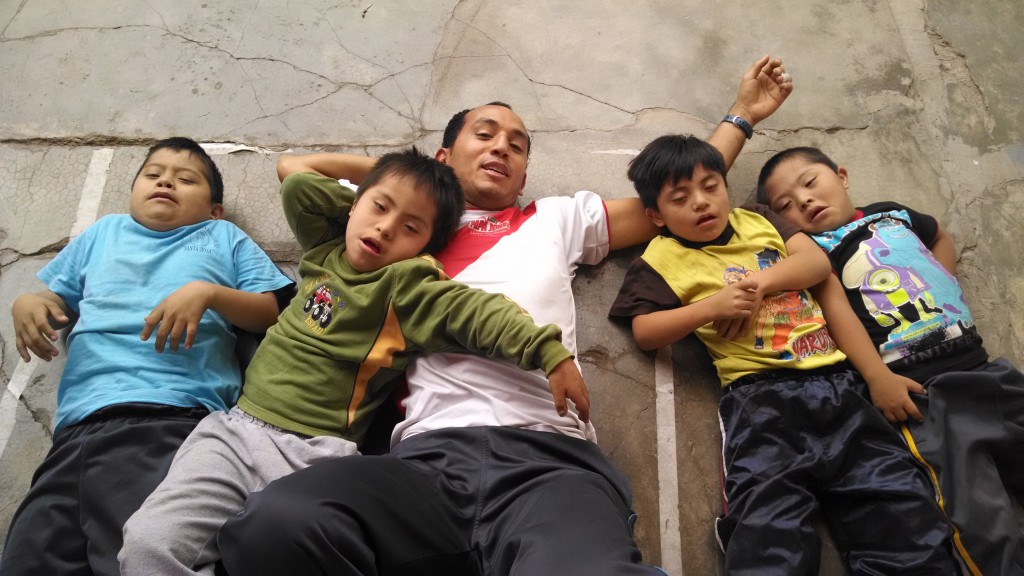 Rafael: One of the positive things has been encouraging basketball as the main sports. We achieved that each child has its own ball. Therefore, this year has increased the population of special children now attend 30. I like to see how each child progresses through simple little things that are great achievements for them. For example, there was a boy who could not jump, but after a lot of work and effort, at the end of year managed to do it. The smile you get when they achieve their goal is exciting. To see the fruit of their dedication is a gift from God. Another nice moment is to see how a young boy from his wheelchair participates in basketball, his teammates push him and he bounces the ball. Rarely score a basket, but when he get the ball, everybody clap and cheer him.
Rafael: One of the positive things has been encouraging basketball as the main sports. We achieved that each child has its own ball. Therefore, this year has increased the population of special children now attend 30. I like to see how each child progresses through simple little things that are great achievements for them. For example, there was a boy who could not jump, but after a lot of work and effort, at the end of year managed to do it. The smile you get when they achieve their goal is exciting. To see the fruit of their dedication is a gift from God. Another nice moment is to see how a young boy from his wheelchair participates in basketball, his teammates push him and he bounces the ball. Rarely score a basket, but when he get the ball, everybody clap and cheer him.
Emily: In the group of moms the activity that unites us is the pastry, but we are there for something else. Once I asked the ladies: “Why do you come?” They mentioned that they do it to make friends, share ideas or to have a space to unfold, but nobody remembered the pastry. They are there to something deeper and has been very good to see how developed the group. For example, two ladies lived on the same block for over twenty years but they didn´t know their names. Last year it was born from them to say a prayer at the beginning and end of the meetings. And even though not all are Catholic, because we have an Adventist lady, take turns leading prayer. This year we made pastries inclusion. We organized a share in the chapel and invite other children to create bonds of friendship. Unfortunately, some children copy the attitudes of their parents and there were children who did not want their special companions dealt them biscuits.
What do you take from this experience?
One comes to the mission with the idea that will give more than receive. But it is never like that. In the mission one receives more than you can give. For me the smile of a child is the most you can receive and the most he can give. I lived in an orphanage and when missionaries arrived to offer me an hour to play, that was enough. I don´t remember gifts or things, but the support of many people. My presence among them is the most important and I do the impossible to make a child smile.
Something you wish to add?
Emily: From the perspective of our friends in the United States, we have stopped our lives for three years to come to the mission. But for me it has been to discover the richness of life.
Rafael: In North America we have forgotten the simple things, our friends tell us that we have sacrificed our lives. They do not know that we are growing and we are uniting ourselves more. The mission has been an experience we could not buy with all the money in the world.




